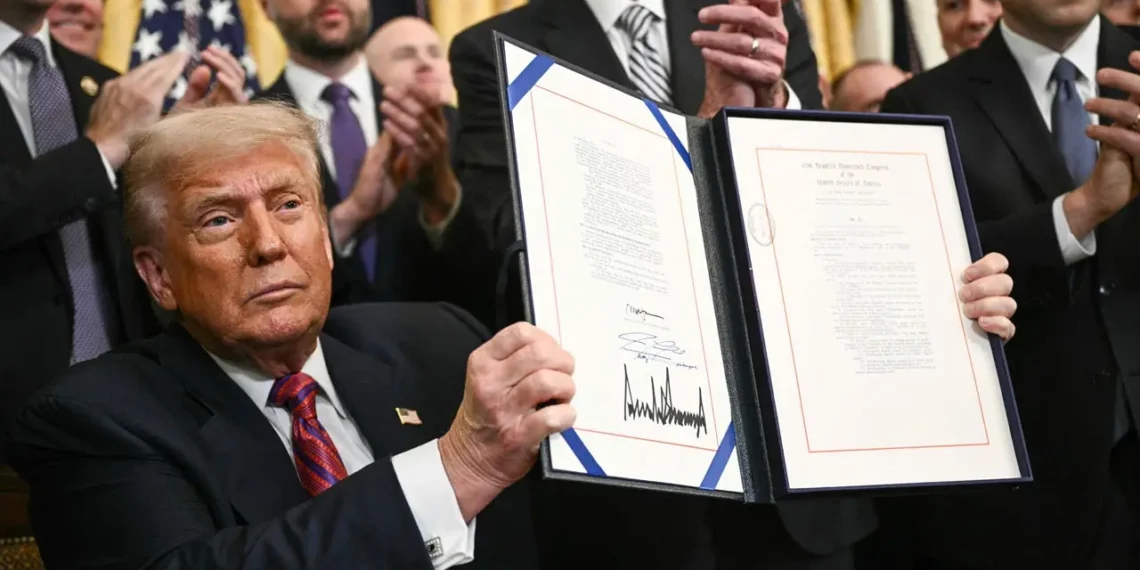President Donald J. Trump has signed the Guiding and Establishing National Innovation for U.S. Stablecoins Act (GENIUS Act) into law, marking a historic milestone in the United States’ embrace of digital currency. Hailed as a “financial revolution,” the legislation establishes the first federal regulatory framework for stablecoins, cryptocurrencies pegged to assets like the U.S. dollar to ensure price stability. This move, part of what Congressional Republicans dubbed “Crypto Week,” positions the U.S. to lead the global digital asset market while reinforcing the dollar’s dominance in the digital economy.
The GENIUS Act, passed by the House of Representatives with a bipartisan 308-122 vote and previously approved by the Senate, creates a comprehensive regulatory regime for stablecoins, a market valued at over $250 billion. Unlike volatile cryptocurrencies like Bitcoin, stablecoins are designed to maintain a stable value, often backed by assets like the U.S. dollar or short-term Treasuries. The legislation requires issuers to maintain 100% reserve backing with liquid assets, disclose reserve compositions monthly, and comply with strict anti-money laundering and sanctions regulations. These measures aim to protect consumers, ensure financial stability, and combat illicit activity in the digital asset space.
President Trump, speaking at the signing ceremony in the White House’s East Room, called the GENIUS Act a “monumental step forward” for financial technology, comparing its potential impact to the advent of the internet. “This could be perhaps the greatest revolution in financial technology since the birth of the internet itself,” he said, surrounded by crypto executives and lawmakers, including bill sponsors Sen. Bill Hagerty (R-Tenn.) and Rep. French Hill (R-Ark.). Trump also lightheartedly noted, “They named it after me,” referring to the act’s acronym.
A core objective of the GENIUS Act is to cement the U.S. dollar’s status as the world’s reserve currency in the digital age. By requiring stablecoin issuers to back their assets with U.S. dollars or Treasuries, the law is expected to drive demand for U.S. government debt, strengthening the nation’s financial system. David Sacks, Trump’s AI and Crypto Czar, emphasized this at the signing, stating, “U.S. dollar dominance is the power of this bill.” The White House projects that the stablecoin market could grow to $2 trillion by 2028, creating significant economic opportunities and attracting global investment to the U.S.
Read also:
- Trump diagnosed with blood circulation disorder
- I’m disappointed but not done with Putin, Trump tells BBC
- Trump slams Putin over Ukraine War, approves new military aid to Zelenskyy
The legislation also aligns state and federal stablecoin frameworks, ensuring consistent regulation nationwide. It prioritizes consumer protection by mandating that stablecoin holders’ claims take precedence in the event of an issuer’s insolvency and prohibits misleading claims that stablecoins are federally insured or legal tender. These provisions aim to build trust in digital currencies, encouraging mainstream adoption by banks, retailers, and consumers for faster, lower-cost transactions.
The GENIUS Act reflects a dramatic shift in Trump’s stance on cryptocurrency. Once a skeptic who dismissed crypto as a “scam,” Trump has embraced the industry in his second term, campaigning on promises to make the U.S. the “crypto capital of the planet.” His administration has taken bold steps to support digital assets, including an executive order in March 2025 to establish a Strategic Bitcoin Reserve and a U.S. Digital Asset Stockpile. Additionally, Trump pardoned Ross Ulbricht, a figure symbolic to the crypto community, and appointed Paul Atkins, a crypto advocate, as SEC Chair, signaling a regulatory environment more favorable to the industry.
Trump’s personal ties to cryptocurrency have also deepened. His family holds a 60% stake in World Liberty Financial, a crypto venture that launched its own stablecoin, USD1, in 2025. While the GENIUS Act bans members of Congress and their families from profiting off stablecoins, this prohibition does not extend to the president, sparking criticism from some Democrats. Sen. Elizabeth Warren (D-Mass.) warned that the law could “supercharge” Trump’s financial interests, accusing it of creating a weak regulatory framework that benefits his business ventures.
The GENIUS Act was one of three crypto-related bills passed during “Crypto Week” in Congress. The Digital Asset Market Clarity Act (CLARITY Act), which defines regulatory boundaries for digital assets, and the Anti-CBDC Surveillance State Act, which bans the Federal Reserve from issuing a retail central bank digital currency (CBDC), also cleared the House and are now under Senate consideration. Trump has vocally opposed a CBDC, stating, “I will never allow the creation of a CBDC in America. It will never happen.” These measures reflect a broader strategy to promote private-sector innovation while limiting government-controlled digital currencies.
However, not all reactions to the GENIUS Act have been positive. Some Democrats and critics, including Rep. Maxine Waters (D-Calif.), argue that the legislation lacks robust consumer protections and could expose the financial system to risks by legitimizing stablecoins without sufficient oversight. Others, like X user @gc22gc, have raised concerns that the act could be a “backdoor” to a CBDC, despite its explicit anti-CBDC provisions, though these claims remain speculative and unverified.
The GENIUS Act is seen as a game-changer for the crypto industry, which has long sought regulatory clarity. Supporters, including executives from firms like Tether, Circle, and Gemini, attended the signing ceremony, celebrating the law’s potential to legitimize stablecoins and integrate them into mainstream finance. Kevin Lehtiniitty, CEO of Borderless.xyz, predicted that “over the next 10 to 20 years, we’re going to see stablecoins become the default method for commerce.”
As federal regulators work to implement the law’s provisions over the next six months, the U.S. is poised to redefine its financial landscape. The GENIUS Act not only strengthens the dollar’s global role but also signals America’s ambition to lead the digital currency revolution. Whether this move will deliver on its promise of innovation and economic growth, or introduce new risks, remains to be seen, but for now, the dollar’s digital transformation has begun.







